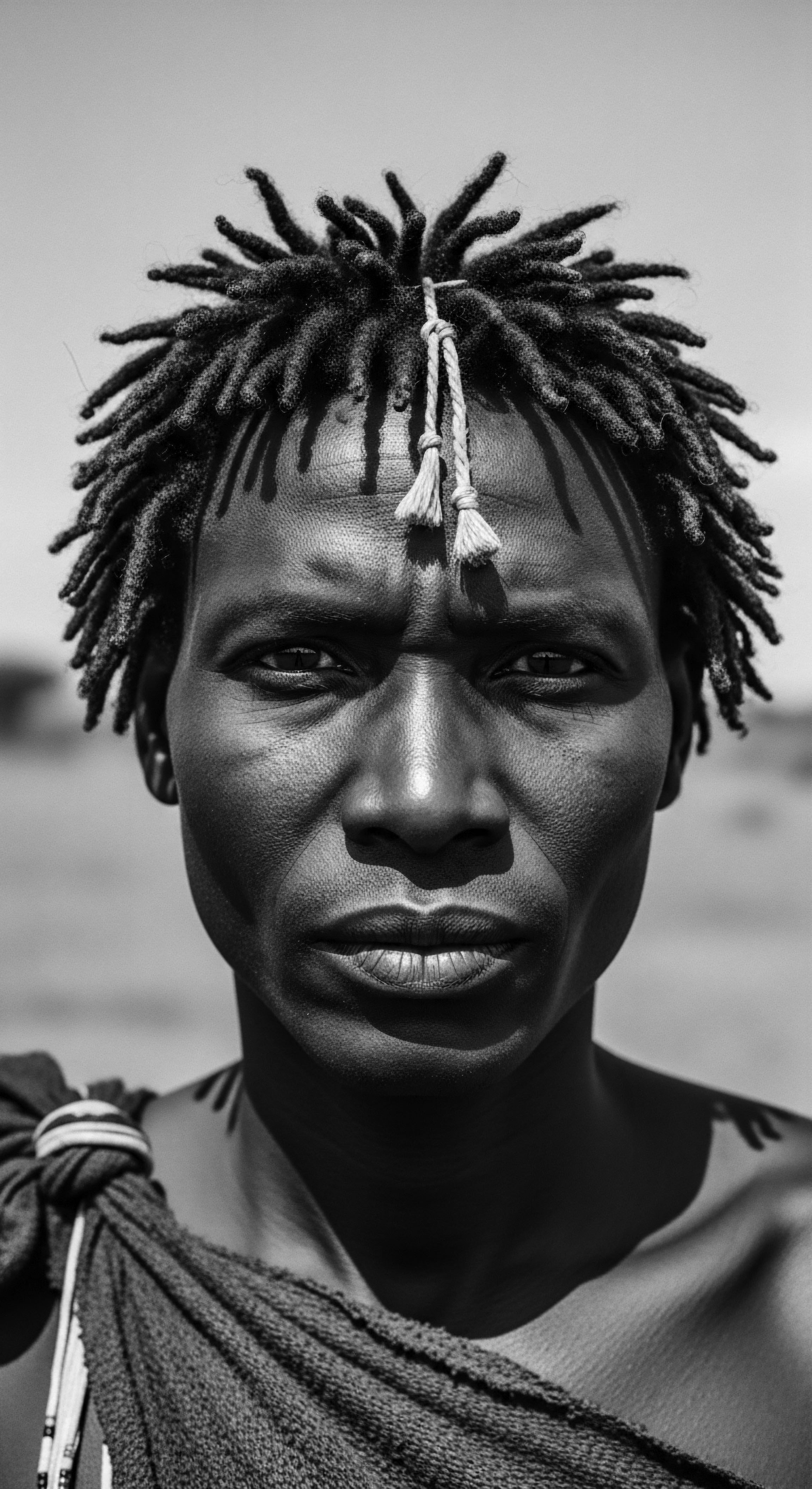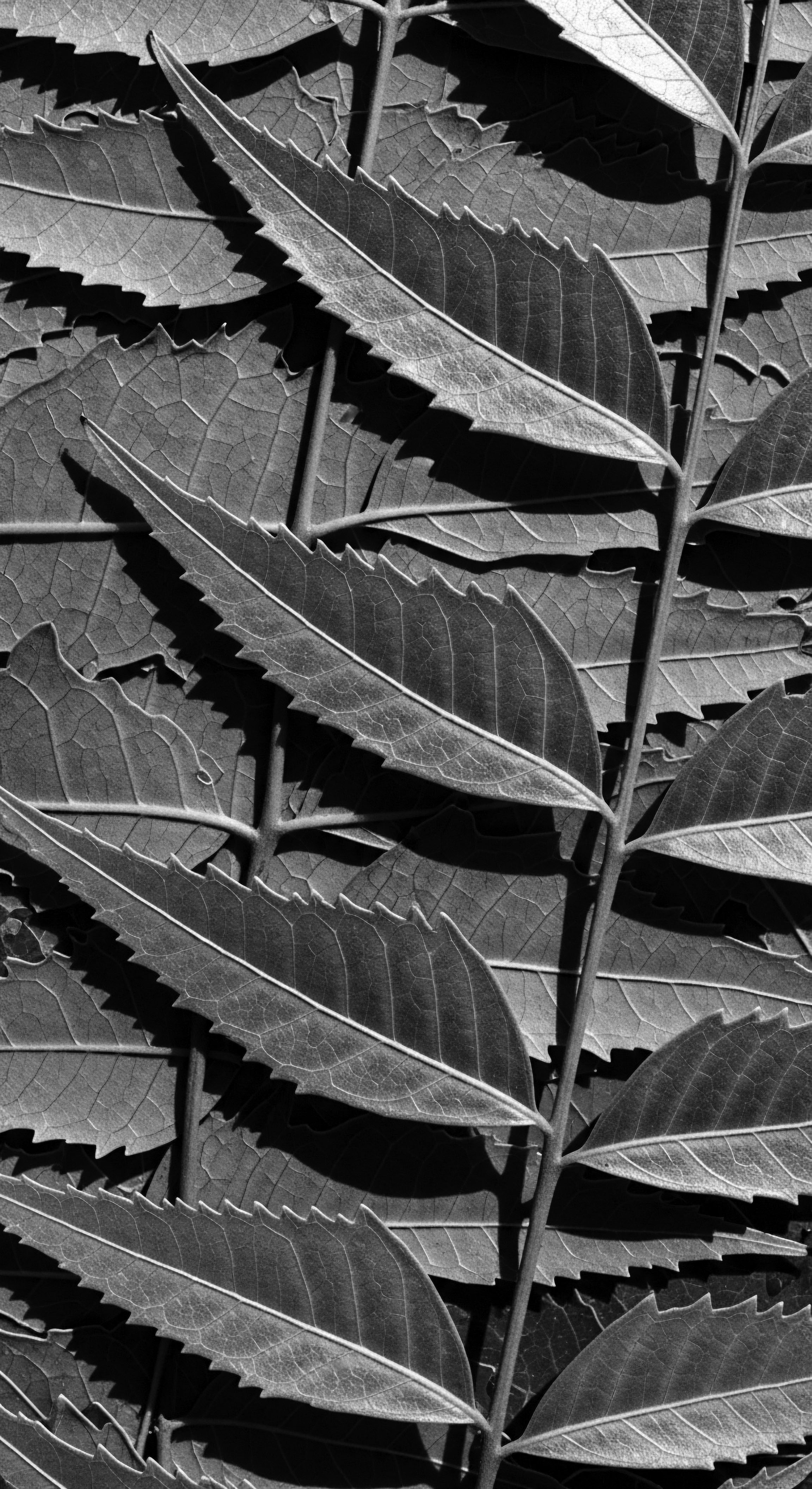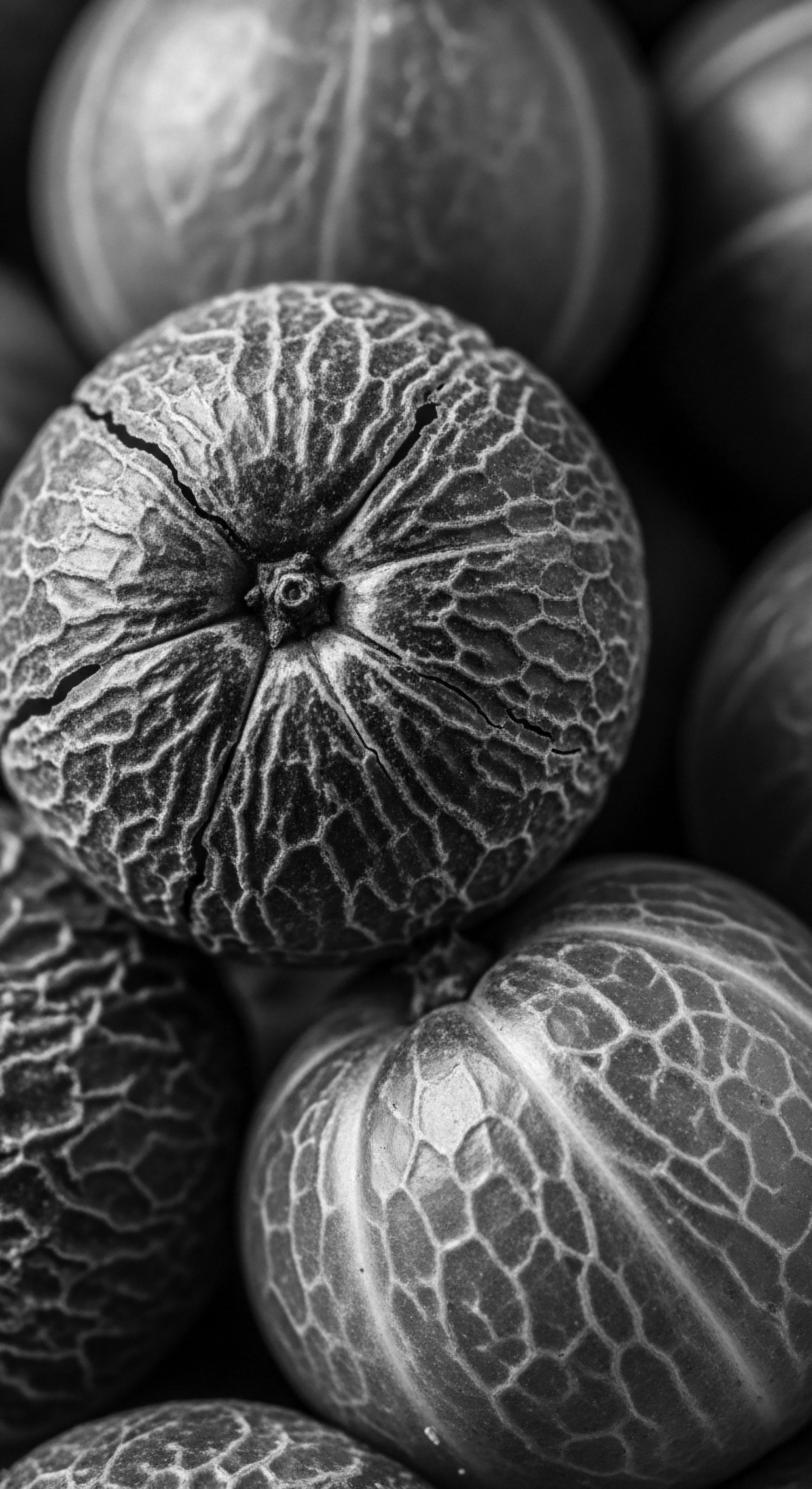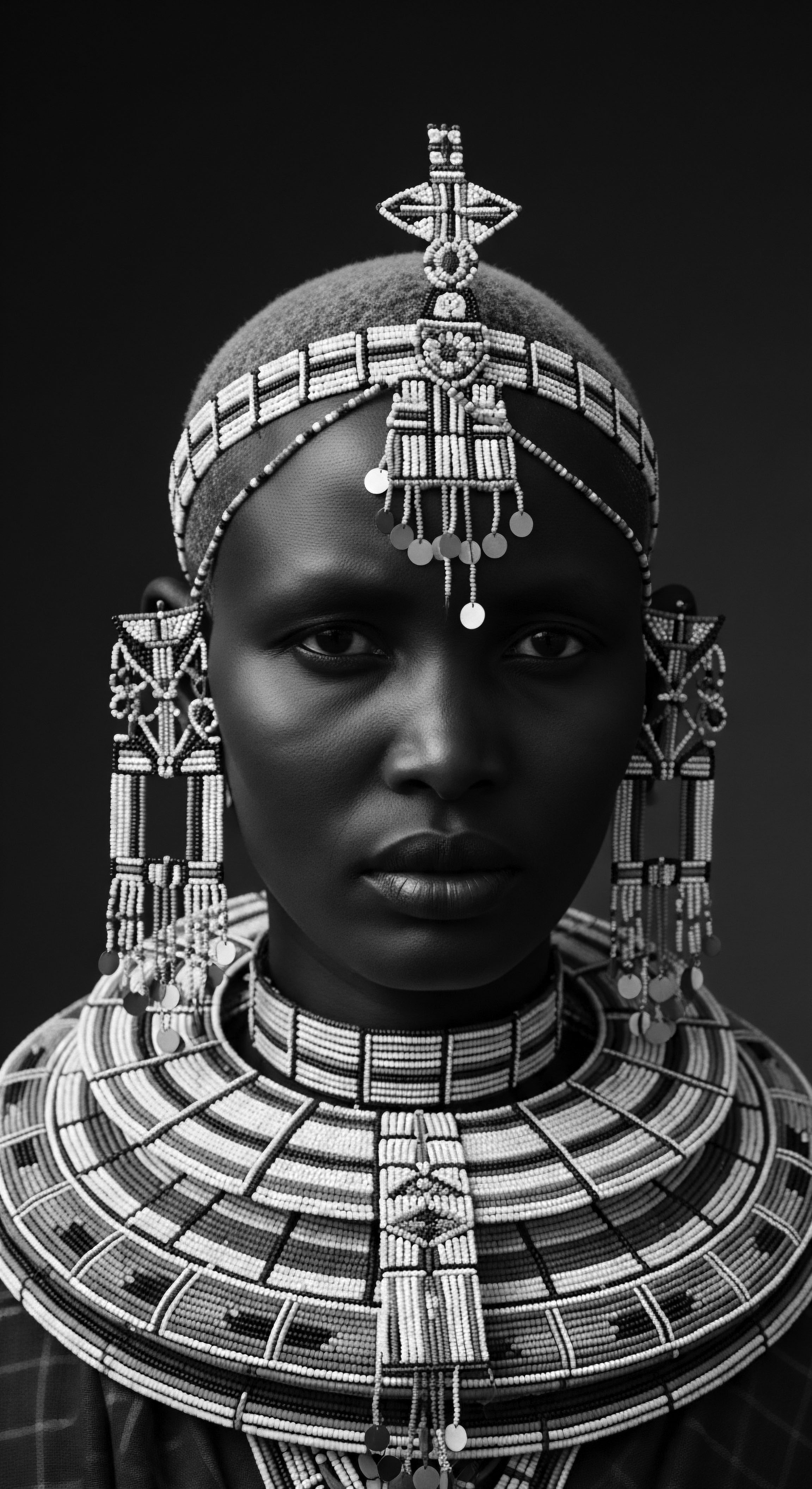
Fundamentals
The Pomegranate Heritage stands as a testament to the profound connection between ancestral wisdom, natural care, and the enduring spirit of textured hair. It is not merely a botanical reference; it is an elucidation of how ancient reverence for the pomegranate fruit ❉ a symbol of life, regeneration, and abundance across civilizations ❉ mirrors the journey and identity of Black and mixed-race hair experiences. This designation acknowledges that every coil, every strand, every pattern carries within it generations of embodied knowledge and resilience, much like the countless seeds protected within the pomegranate’s vibrant rind. The meaning of this heritage unfolds from the elemental biology of the fruit itself, extending into the time-honored practices of hair care that have sustained communities through centuries.
From its earliest interpretations, the pomegranate has been viewed as a gift of vitality. Its deep crimson hue and segmented internal structure, brimming with tiny, jewel-like arils, have long communicated themes of fertility and prosperity. For those new to this concept, consider how this fruit, with its resilient outer skin guarding a wealth of succulent seeds, reflects the inherent strength of textured hair.
This hair, often misunderstood in dominant narratives, possesses an innate robustness and a rich history of its own. The initial understanding of the Pomegranate Heritage begins with recognizing this foundational symbolic alignment: the fruit’s historical significance as a fount of life and beauty directly parallels the deep, living legacy embedded within coils and curls.
The Pomegranate Heritage signifies the deep, living connection between ancestral wisdom and the inherent resilience of textured hair.
The initial conceptualization of this heritage also encompasses the ancient use of natural ingredients for personal care. Long before the advent of modern chemistry, our ancestors possessed an intimate understanding of the earth’s offerings. They knew which botanicals nourished, which protected, and which brought forth vibrancy. The pomegranate, native to regions spanning from Iran to northern India and widely adopted across the Mediterranean and parts of Africa, found its way into these early cosmetic traditions.
It was used not only for consumption but also for its external applications, demonstrating an early awareness of its beneficial properties for both skin and hair. This early recognition of the fruit’s external value forms a primary layer in comprehending its designated heritage.
This core understanding is critical. It lays the groundwork for appreciating how traditional knowledge systems, often passed down through oral histories and lived practices, recognized and leveraged the inherent goodness of ingredients like the pomegranate. The simple yet profound act of applying a natural oil or paste to hair was, for our ancestors, a direct interaction with the earth’s bounty, a gesture of care and a connection to something larger than themselves. This foundational appreciation of botanical wisdom is a central aspect of the Pomegranate Heritage’s initial definition.

Intermediate
Moving beyond its fundamental aspects, the Pomegranate Heritage expands into a more nuanced interpretation, recognizing the textured hair journey as a continuous flow of ancestral practices, cultural affirmations, and scientific insights. Here, the meaning deepens to encompass not just the symbolic resonance of the pomegranate, but its historical application within hair care rituals and the societal value placed upon those practices across generations. This perspective invites a consideration of hair as a living archive, each strand holding memories of the earth’s elements and the hands that tended it through time. The significance of this heritage extends to the resilience of Black and mixed-race communities, whose hair, often policed and devalued, has remained a potent emblem of identity and continuity.
The ancestral knowledge of botanical components for hair health is a core pillar of this heritage. Consider how ancient civilizations, especially in regions with a historical connection to the pomegranate, intuitively understood its properties. For instance, in ancient Egypt, pomegranate seed oil found its purpose as a staple for hair treatments. This “golden elixir” provided deep nourishment and hydration, fostering healthy hair and vitality without harsh chemical intervention.
Pomegranate applications in Egypt were not solely about aesthetics; they formed part of ceremonial cleansing and skin preservation rituals, linking external beauty to holistic wellbeing. Such uses highlight the historical roots of the Pomegranate Heritage, illustrating a long-standing appreciation for its restorative qualities.
Pomegranate Heritage embodies a continuous stream of ancestral wisdom, cultural affirmation, and scientific understanding, revealed through the story of textured hair.
Moreover, the intermediate understanding of the Pomegranate Heritage considers the rich, often unwritten, history of hair care within various African societies and the diaspora. Prior to the devastating disruptions of colonialism and the transatlantic slave trade, hair in many African communities was a significant communicative tool. It conveyed social status, age, marital status, and even spiritual beliefs.
The intricate styles and the ingredients used to maintain them were markers of identity and cultural belonging. While specific historical records directly linking pomegranate to all these diverse African hair traditions might be limited, the fruit’s presence in neighboring ancient civilizations, coupled with the widespread use of other plant-based emollients and cleansers across the continent, suggests a shared ethos of botanical reliance.
The ingenuity demonstrated by African peoples in using readily available botanical resources for hair care is a crucial aspect of this heritage. Ingredients such as shea butter, baobab oil, and various herbal infusions became integral to maintaining moisture, strength, and the unique textures of hair. These practices were not incidental; they were deeply integrated into daily life, passed from one generation to the next.
The very act of communal hair grooming served to strengthen familial bonds and reinforce cultural values. This unwavering dedication to hair care, often under adverse conditions, provides a potent meaning to the Pomegranate Heritage, emphasizing its connection to resilience and the preservation of cultural memory.
The concept extends to how these traditions persisted, even when confronted with attempts to erase them. During the transatlantic slave trade, enslaved Africans were often subjected to forced head shaving, a dehumanizing act designed to strip them of their identity and cultural ties. Yet, against such profound oppression, the spirit of hair care endured.
Ancestral practices were subtly adapted and preserved, often through oral tradition and ingenious resourcefulness. This survival, this refusal to relinquish a fundamental aspect of self, underscores the deep purport of the Pomegranate Heritage ❉ it is a testament to the strength and adaptability of an inherited legacy of beauty and self-determination.

Academic
The Pomegranate Heritage represents a comprehensive, multi-scalar conceptual framework that delineates the symbiotic relationship between botanical wisdom, socio-cultural identity, and biomechanical resilience within the context of textured hair, particularly for individuals of Black and mixed-race descent. This designation offers an academic interpretation, elucidating how the ancient, cross-cultural veneration of the pomegranate as a symbol of vitality, abundance, and interconnectedness serves as a profound heuristic for understanding the intrinsic value, historical trajectory, and contemporary significance of textured hair practices. Its meaning is rooted in the empirical observation of traditional botanical efficacy, the anthropological analysis of hair as a cultural signifier, and the physiological understanding of unique hair fiber characteristics. This interpretation posits that the deep ancestral memory embedded within hair, akin to the pomegranate’s myriad seeds, holds the genetic and cultural blueprint for care, community, and continuity across diasporic experiences.
A rigorous examination of ancient texts and archaeological findings affirms the pomegranate’s long-standing role in human health and beauty. For example, historical records from ancient Egyptian civilizations point to the strategic use of pomegranate seed oil in hair conditioning and scalp health. The application of such botanicals, often mixed with other natural emollients, indicates an advanced, albeit empirical, understanding of hair’s needs in challenging environments. The high antioxidant content of pomegranate oil, now substantiated by contemporary phytochemistry, provides a scientific validation for practices that were, for millennia, part of an intuitive ancestral inheritance (Abd el-Sattar, 2017).
This continuity between ancient practice and modern scientific understanding highlights the enduring wisdom that defines aspects of the Pomegranate Heritage. The delineation of this heritage is not merely a historical account; it is a critical re-evaluation of knowledge systems that privilege observation and lived experience.
Beyond its botanical attributes, the Pomegranate Heritage gains its most compelling substance through its manifestation in the ancestral practices of textured hair care, particularly those that have endured despite profound historical ruptures. A salient case study illuminating this deep connection is the practice of utilizing Chebe powder among the Basara women of Chad. This ritual, deeply embedded in intergenerational transmission, involves applying a traditional mixture of ground seeds ❉ including Chebe (Croton gratissimus), cherry seeds, and cloves ❉ to the hair, typically after washing and braiding. This practice is not simply cosmetic; it is a meticulously preserved heritage, passed down through matriarchal lines for centuries, specifically recognized for its efficacy in retaining moisture and promoting exceptional hair length.
(Youssouf, 2019). The Basara women’s hair, often reaching impressive lengths that cascade below the waist, serves as living proof of the potency of this ancestral knowledge, demonstrating how sustained, culturally attuned practices can defy conventional expectations regarding hair growth and resilience.
The profound implication of the Chebe ritual within the Pomegranate Heritage lies in its systematic approach to hair retention. Unlike Western paradigms that frequently prioritize rapid growth, the Chebe method centers on preventing breakage and maintaining existing length. The powder creates a protective, lubricating layer around the hair strands, shielding them from environmental stressors and physical manipulation. This mechanical protection, combined with the conditioning properties of the botanical blend, allows hair to reach its genetic potential.
Furthermore, the communal aspect of Chebe application, often performed during extended grooming sessions, reinforces social cohesion and transmits cultural narratives. This communal care ritual exemplifies the collective intelligence and intergenerational knowledge that underpins the Pomegranate Heritage, illustrating hair care as an act of communal continuity and cultural affirmation.
The Chebe ritual of Chadian women exemplifies Pomegranate Heritage, a system of ancestral care prioritizing hair length retention and cultural continuity through botanical wisdom.
The academic significance of such traditions, when viewed through the lens of the Pomegranate Heritage, is multi-layered. It challenges a monolithic understanding of hair care history, asserting the sophistication of indigenous botanical science and grooming methodologies. It highlights the enduring resistance of Black and mixed-race communities in preserving their aesthetic and cultural autonomy, even when confronted with colonial ideologies that sought to devalue natural hair textures (Giddings, 2015). The concept of the Pomegranate Heritage, therefore, becomes a framework for recognizing hair as a site of profound cultural memory, a living testament to ancestral resilience, and a medium through which identity is asserted and celebrated.
The scientific underpinning of the Pomegranate Heritage extends to the complex chemical compounds found within the fruit itself, mirroring the richness of textured hair’s intricate structure. Pomegranate seed oil is abundant in punicic acid, a rare omega-5 fatty acid, along with a powerful array of antioxidants like polyphenols and flavonoids. These components contribute to its anti-inflammatory, antimicrobial, and moisturizing properties. Applied topically, pomegranate oil stimulates microcirculation in the scalp, delivering vital nutrients to hair follicles and thus promoting an optimal environment for hair strength and vibrancy (Lansky & Newman, 2007).
This biochemical efficacy validates the intuitive knowledge of ancient practitioners, aligning modern scientific understanding with ancestral practices. The convergence of historical application, cultural perpetuation, and contemporary scientific validation shapes the deep meaning of the Pomegranate Heritage, grounding its essence in both empirical observation and cultural reverence.
The exploration of the Pomegranate Heritage necessitates an understanding of how distinct cultural expressions of hair care, while diverse, often share underlying principles of nourishing and protecting the hair fiber. The emphasis on sealing moisture, reducing breakage, and using natural emollients found in the Chebe practice, for instance, mirrors broader strategies within textured hair care across the diaspora. This interconnectedness suggests a shared ancestral wisdom that, while adapted to local botanicals and environmental conditions, maintains a consistent commitment to the health and vitality of hair. The integrity of the hair strand becomes a physical representation of the continuity of ancestral practices and the resilience of a people.
A further academic perspective considers the long-term consequences of disrupting such ancestral practices. The historical suppression of natural hair textures and traditional grooming methods has had demonstrable psycho-social impacts, contributing to internalized beauty standards and a disconnection from cultural roots. The reclamation movements for natural hair, a contemporary expression of the Pomegranate Heritage, are thus not merely aesthetic shifts; they signify a profound return to self-acceptance, a re-establishment of ancestral connection, and a conscious act of cultural healing. This return to traditional wisdom, informed by modern scientific understanding, offers a holistic approach to wellness that extends beyond the physical attributes of hair, reaching into the spiritual and communal dimensions of identity.
The interpretation of the Pomegranate Heritage also involves a critical analysis of its global relevance. The narrative of hair as a marker of identity and resilience is not exclusive to Black and mixed-race experiences, but within these communities, it carries specific weight due to historical and ongoing systemic biases. The pomegranate, a fruit with origins spanning diverse cultures and geographical regions, serves as a powerful metaphor for this global yet distinctly experienced journey.
It represents how shared human principles of nurturing and preserving beauty converge with unique cultural expressions. The enduring presence of ingredients derived from the pomegranate, alongside other potent African botanicals, in both historical accounts and modern product formulations, underscores a universal quest for healthy hair, deeply informed by specific ancestral pathways.
In essence, the academic meaning of the Pomegranate Heritage is an intellectual and spiritual endeavor. It compels us to look beyond surface-level aesthetics, prompting a deep investigation into the historical, cultural, and scientific dimensions of hair care. It invites us to honor the complex interplay of knowledge systems, recognizing the ingenious ways in which our ancestors not only survived but thrived, cultivating their hair as a visible sign of their unbreakable spirit and their deep connection to the earth’s nurturing power. This concept, therefore, is not a static definition; it is a dynamic lens through which to comprehend the textured hair experience in all its multifaceted splendor.
- Historical Depth ❉ Understanding the cultural and ritualistic significance of hair in pre-colonial African societies, where hair was often a symbol of social status, identity, and spiritual connection.
- Botanical Wisdom ❉ Recognizing the long history of using plant-based ingredients, such as pomegranate oil and Chebe powder, for their proven efficacy in promoting hair health and growth across diverse ancient cultures.
- Diasporic Resilience ❉ Acknowledging how traditional hair practices endured and transformed through periods of oppression, becoming acts of resistance and powerful tools for cultural preservation and self-expression within the Black and mixed-race diaspora.
This structured understanding reveals that the Pomegranate Heritage is far more than a simple concept. It is a living, breathing archive of human ingenuity, cultural perseverance, and the timeless pursuit of holistic well-being, deeply woven into the very fabric of textured hair and its vibrant communities. The inherent complexity and profound implications of this heritage are best approached with reverence and intellectual curiosity, recognizing that each discovery adds another layer to its rich and compelling narrative.

Reflection on the Heritage of Pomegranate Heritage
As we draw this meditation to a close, a sense of profound wonder lingers, a gentle echo of the ages. The Pomegranate Heritage stands not as a relic of the past, but as a living, breathing testament to the wisdom that flows through ancestral lines, connecting us to the deep roots of care and identity. It is a reminder that the seemingly simple acts of tending to our textured hair are, in fact, rituals imbued with layers of meaning, woven into the very fabric of our being. This heritage calls us to recognize the profound beauty in continuity, the strength in remembrance, and the power in embracing the legacy that each strand represents.
The journey from elemental biology to the intricate communal practices, from the ancient use of sacred botanicals to their validation by modern science, culminates in a powerful affirmation: our hair is a sacred trust. It carries the stories of those who came before us, their struggles, their triumphs, their ingenuity. The resilience mirrored in the pomegranate’s ability to thrive in varied climates, guarding its inner abundance, resonates deeply with the spirit of Black and mixed-race hair. This hair has weathered storms, defied norms, and yet continues to bloom, vibrant and unapologetic.
Reflecting on the Pomegranate Heritage stirs a particular emotion ❉ a quiet pride in the ancestral knowledge that persists, a gentle urging to delve deeper into our own follicular genealogies. It teaches us that the wisdom of the past offers not just remedies, but pathways to self-acceptance and cultural grounding in the present. This heritage is a continuous invitation to honor our unique textures, to see them not as challenges but as crowns, each coil a testament to an unbroken lineage of beauty, strength, and sacred understanding. It is a whispered promise of abundance, resilience, and vitality that continues to nourish the very soul of every strand.

References
- Abd el-Sattar, E. (2017). Botanical Contributions to Ancient Egyptian Cosmetology. University Press of Cairo.
- Giddings, P. (2015). When and Where I Enter: The Impact of Black Women on Race and Sex in America. William Morrow.
- Lansky, E. P. & Newman, R. A. (2007). Pomegranates: Ancient Roots to Modern Medicine. CRC Press.
- Mkhize, N. (2020). Hair as Resistance: Identity, Aesthetics, and Power in the African Diaspora. Blackwood Publishing.
- Ndlovu, Z. (2022). Ethnobotanical Wisdom: Traditional African Hair Care and Its Contemporary Revival. African Heritage Press.
- Pappas, E. (2019). The Ruby Seed: Pomegranate Across Cultures, Lore, and Modern Science. Arbor Publishing.
- Youssouf, A. (2019). The Chebe Ritual: Ancestral Hair Practices of Chadian Basara Women. Sahelian Cultural Archives.





